Ed Gorman's Blog, page 114
October 3, 2013
Bookgasm You Can’t Kill a Corpse reviewed by BRUCE GROSSMAN
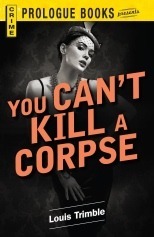
Over at the fine fine fine site Bookgasm reviewer Bruce Grossman is fond of unearthing truly forgotten books. He writes very well and he knows how to shape his material. And again he leads us to books that deerve a second chance.
You Can’t Kill a Corpseby BRUCE GROSSMAN on OCTOBER 3, 2013 · 1 COMMENTJim Clane is a salesman. Well, that’s how he presents himself. Clane is more a gun-for-hire type of worker — a man who you give a large sum of money to do jobs that no one else will. This time he is hired to “help” with a local election by trying to discredit the mayor who has been in office far too long — that’s according to Thorne, the man who hired Clane.Once Clane is in town, it’s obvious the town is about as crooked and corrupt as they come. So this job becomes even more intriguing for Clane. He figures the best way to get started at his job is to become a distraction of sorts, with his first actions of that causing a near-panic at the political gathering.Soon, Clane becomes the scorn of the local mayor and his very important influential friends. But none of this is going to dissuade him from his job.Then things take a turn that Clane did not expect, after meeting with a local reporter who winds up dead with plenty of evidence around his body to show someone is being set up. But that’s not the only death that happens — just as soon as the body of the reporter winds up in Clane’s lap, so to speak, when the local newspaper publisher is also dead. It is made to look like a suicide, except the gun that did the deed is missing.for the rest go here: http://www.bookgasm.com
/reviews/crime/you-cant-kill-a-corpse/#more-24175
Published on October 03, 2013 11:22
October 2, 2013
Forgotten Books: Lemons Never Lie by Richard Stark;Tom Clancy-Marty Greenberg
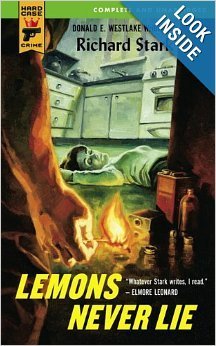
Forgotten Books: Lemons Never Lie by Richard Stark
There are so many twists, turns, starts and stops in Lemons Never Lie by Donald E. Westlake as Richard Stark that the novel becomes a kind of a crime picaresque filled with mugs, thugs, killers, victims and Parker's redoutable thespian friend, Alan Grofiled. There's also a lot of notably brutal violence.
The book begins with Grofield visiting Vegas to partake of a robbery that will give him the money to survive one more season in his summer theater. Grofield, in case you didn't know, is a "purist" when it comes to acting, his chosen profession. No movies or television for him. Stage only. But it takes his other profession, robbery, to support his theater. Only his long-supportive wife understands how hard he works at both careers.
A man named Myers has set up a robbery plan and has called in amateurs to help him. With the exception of a man named Caithcart and a dangerous man named Dan Leach, the group is a zero. As is Myers. Now Myers, who speaks with a boarding school accent, is one of the great villains in Westlake's world. He is a true sociopathic murderer; a serial killer of a kind. Grofield and Leach decide against working with him.
This is the set-up. There's an early twist that lets us know just how nasty Myers is. And then the various adventures start. Grofield resembles his friend (and fellow robber) Parker only occasionally. For instance, he loves chit-chat, feels sorry even for a guy who tries to kill him and lets another live that (as reader) you know should be killed on the spot, slowly and joyously.
There's also a lot of witty humor. Grofield gets into the damnedest conversations with people. Once in a while you may even forget you're reading a crime novel. Westlake has a great time riffing on all the cliche exchanges you read in most crime fiction. At a couple of point Grofield starts sounding like a TV shrink.
Lemons Never Lie is Westlake at his very best. While there's a screwball comedy-feel to some of the misadventures, the unrelenting violence reminds readers that the Richard Stark is the master of the hardboiled. The masterful plotting, the wry way the genre cliches are turned inside out, and the earnestness and humanity of Alan Grofield make this a pleasure from page one to the unexpected ending.TOM CLANCY-MARTY GREENBERG
By now many of you know that Marty Greenberg was my best friend and business partner for nearly thirty years. He did a number of books (as a packager) with Tom Clancy. One of my memories of their relationship was how Clancy was always trying to convert Marty to Christianity. I suppose it was well-intentioned (if arrogant) but Marty was understandably a proud Jew. It didn't take.:)
Published on October 02, 2013 14:17
October 1, 2013
RICHARD MATHESON ENTERS THE TWILIGHT ZONE
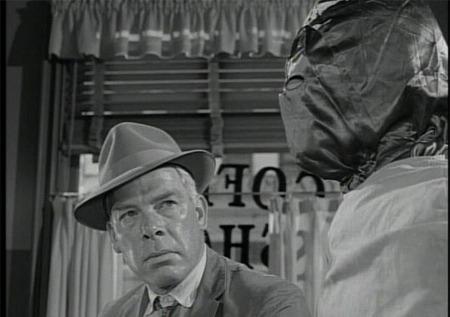
RICHARD MATHESON ENTERS THE TWILIGHT ZONE Posted by R. Emmet Sweeney on July 9, 2013 From Movie Morlocks
Richard Matheson was already an established writer in 1959, the year he started contributing to The Twilight Zone. But it took him a while. Over the course of the 1950s he rose from pitching sci-fi magazines on his off hours as a mailman, to adapting his own material to screens large and small. He sold his first story, “Born of Man and Woman”, to The Magazine of Fantasy and Science Fiction in 1950. After a couple of suspense novels fizzled, he garnered notice with his post-apocalyptic survival staple, I Am Legend (1954). It was his follow-up, The Shrinking Man (1956), that cemented his place in popular consciousness. He ingeniously sold himself as screenwriter as part of the film rights deal to Universal, and he would be a prolific writer for film and TV for decades to come (alongside his novels and short stories). As part of our week-long tribute to Matheson, following his death last month at the age of 87, I’ll be looking at the Twilight Zone episodes he declared to be his favorite, Steel and Night Call, both from Season 5. They present fantastical premises with procedural detail, as he also did with I Am Legend and The Shrinking Man, bringing the spectacular down to earth.After the success of The Shrinking Man and its movie adaptation (which added Incredible to the title), Matheson moved to television writing, often with collaborator with Charles Beaumont. They were close friends, part of a circle of fantasy writers that included Robert Bloch, Ray Bradbury and Harlan Ellison. Matheson recalled that, “When we joined this agency [Adams, Jay and Rosenberg] it was such a strange new world out there that we decided to work together.” Beaumont and Matheson worked on cop shows and Westerns like Bourbon Street Beat and Have Gun — Will Travel.Their most long-lasting contribution was to The Twilight Zone, which they both began contributing to, separately, in ’59. Rod Serling was a fellow traveler in the speculative arts, and provided an invaluable platform for the kind of material they wanted to write, even with showbiz compromises. Their material, as Matheson notes, “never made any social commentary”. They were detail men, interested in fleshing out their imagined worlds rather than allegorizing the existing one.
for the rest go here:http://moviemorlocks.com/2013/07/09/r...
Published on October 01, 2013 12:12
September 30, 2013
New Books: NEVER COME BACK by David Bell
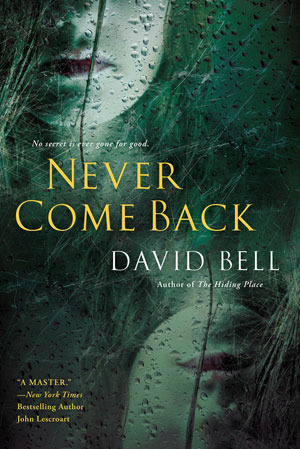
NEVER COME BACK (available from NAL/Penguin October 1st) tells the story of Elizabeth Hampton a twenty-five-year old graduate student whose mother is found dead in the opening chapter. The police suspect homicide almost right away due to the bruises on her mother’s body, but who would have a motive to murder a quiet, retired, sixty-nine-year old widow? Suspicion falls on members of the family, most notable Elizabeth’s older brother, Ronnie, an adult with Down Syndrome. Ronnie can’t fully account for his whereabouts on the night of the crime, and in the past he has had violent outbursts directed at his mother.
But is Ronnie really guilty? Or is he just a convenient target for the police? Elizabeth’s life gets more complicated when she reads her mother’s will and discovers that her mother’s small estate is being shared with a woman Elizabeth has never heard of before. And this woman’s name also happens to be Elizabeth.
Let’s be honest…when we’re kids, we’re pretty self-centered. We can’t imagine that our parents had lives before we were born. But do we really want to know everything about our parents? What if the things we find out about them are things that change our lives forever? Elizabeth Hampton faces this dilemma in NEVER COME BACK, a book that Kirkus Reviews called “an intriguing psychological thriller” and Publishers Weekly added that “Bell does a good job of exposing the steaminess underlying seemingly placid smalltown life…sensational.”
David Bell is the author of four previous novels including THE HIDING PLACE and CEMETERY GIRL. Visit his website at davidbellnovels.com, follow him on Twitter @davidbellnovels and Facebook at facebook.com/davidbellnovels.
Published on September 30, 2013 10:34
September 28, 2013
Forgotten Books: The Evil Days by Bruno Fischer
Forgotten Books: The Evil Days by Bruno FischerBruno Fischer had one of those careers you can't have any more. There's no market for any of it. He started out as editor and writer for a Socialist newspaper, shifted to terror pulps when the newspaper started failing, became a successful and respected hardcover mystery novelist in the Forties and early Fifties, and finally turned to Gold Medal originals when the pb boom began. His GMs sold in the millions. His House of Flesh is for me in the top ten of all GMs.
Then for reasons only God and Gary Lovisi understand, Fischer gave up writing and became an editor for Colliers books. But he had one more book in him and it turned out to be the finest of his long career.
Fischer shared with Howard Fast (Fast when he was writing mysteries under his pen names) a grim interest in the way unfulfilling jobs grind us down, leave us soulless. Maybe this was a reflection of his years on the Socialist newspaper. The soullessness features prominently in The Evil Days because it is narrated by a suburban husband who trains to work each day to labor as an editor in a publishing company where he is considered expendable. Worse, his wife constantly reminds him (and not unfairly) that they don't have enough money to pay their bills or find any of the pleasures they knew in the early years of their marriage. Fischer makes you feel the husband's helplessness and the wife's anger and despair.
The A plot concerns the wife finding jewels and refusing to turn them in. A familiar trope, yes, but Fischer makes it work because of the anger and dismay the husband feels when he sees how his wife has turned into a thief. But ultimately he goes along with her. Just when you think you can scope out the rest of the story yourself, Fischer goes all Guy de Maupassant on us. Is the wife having an affair? Did she murder her lover? Is any of this connected to the jewels? What the hell is really going on here?
Sometimes we forget how well the traditional mystery can deal with the social problems of an era and the real lives of real people. The hopelessness and despair of these characters was right for their time of the inflation-dazed Seventies. But it's just as compelling now as it was then when you look at the unemployment numbers and the calm reassurances by those who claim to know that the worst is yet to come.
All this wrapped in one hell of a good tale by a wily old master.
BLOG ARCHIVE► 2013 (257)► 2012 (349)► 2011 (383)► 2010 (347)▼ 2009 (365)▼ December (31)30 EockI've never heard of Slamdance either but what the ...Yes, he's still peddling his bookNo Ayn Rand; lotsa John D. MacDonaldFree e Books--good thing or bad?All That Fosse; FacebookKILLER by Dave ZeltsermanAnd to all a good nightHappy FestivusBad ReviewsBrittany Murphy, R.I.P.Year's Best TVPatricia Highsmith, comic book writerYes you can buy it now-nobody will stop you-honest...PRO-FILE: MAX ALLAN COLLINSFORGOTTEN BOOKS: CROSS COUNTRY; THE BOOK BIZJames ReasonerLeigh Brackett-Edmond Hamilton -The Big SleepStuffAvailable now: A wonderful novel by a truly wonder...Mystery.File.com; The Thrilling Detective siteJohn TrinianForgotten Books: Bonjour Tristesse by Francoise Sa...E-books: Richard Curtis, Nat SobelThe New Pulp PressHow low can you go?Block; Monk; Zeltserman; PiccirilliThe 25th Hour; Don CongdonForgotten Books: The Evil Days by Bruno FischerThe new Mystery Scene!Rita and Bob; Mensa List► November (30)► October (29)► September (27)► August (26)► July (28)► June (33)► May (33)► April (39)► March (30)► February (29)► January (30)► 2008 (337)► 2007 (355)► 2006 (58)

LINKSEd Gorman Home PageBiographyBibliographyEd's EmailEd's Books @ Amazon

OTHER BLOGS OF NOTEBill CriderJames ReasonerSandra ScoppettoneSarah WeinmanVince KeenanLee GoldbergWesterns for TodayMystery*FileLocus MagazineShocklinesBookgasmThe Rap SheetMediaBisto.Com: GalleyCat

ABOUT ME

ED GORMANVIEW MY COMPLETE PROFILE

Published on September 28, 2013 13:44
September 27, 2013
New Books: TWIST by John Lutz
NEW BOOKS: John Lutz
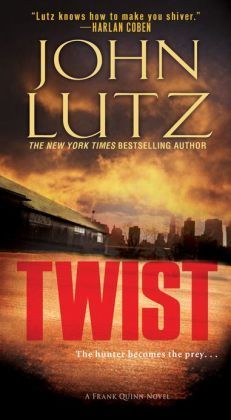
TWIST is the title of my latest serial killer novel featuring former NYPD homicide detective Frank Quinn. It is the eighth in the Quinn series. I think there’s plenty of room for more. That’s because of what makes this kind of novel work. That would be women In danger. Because of women in danger, the future of novels like TWIST is assured. The term “serial killers” suggests female victims. Almost always such killers are men. Almost always their victims are women.I wrote TWIST for a number of reasons, only one of which was that serial killers sold well. The reason might be that they contain a story structure similar to that of a real serial killer investigation. In real life, and in serial killer novels, something terrible happens – like a gruesome sex-crime murder -- that seizes the public’s (the reader’s) interest. A psychosexual killer is on the loose. Then the main character, the lead detective, is introduced –– either in the novel or in the news media -- and the investigation becomes a chess game and a mano-a-mano exercise.So it is with TWIST and Frank Quinn. The murders continue, and danger and difficulties increase, along with fear, building to a crisis, climax, and anti-climax (the trial and its result).Just like in real life – or close enough to achieve a scary kind of plausibility.And as in real life, the reader wonders why somebody would commit such a crime over and over. How did the killer become twisted to the point of almost inhuman disdain and cruelty?The answer, of course, is in the past. One thing most serial killers have in common is a horrible and twisted childhood. Of course, other people have such childhoods and grow up to lead normal and harmless lives. What the difference in them is remains an illusive source of wonderment, as we hear about and learn about the twisted minds of those who harbor such evil. How can they do that?How did they become so twisted?Many if not most readers of serial killer novels are women. As my wily editor points out, most women enjoy a good safe scare. The operable word is safe. TWIST is safe. It can be escaped simply by closing the book.The lead in and the rest of the story structure are there. Not unfamiliar, but always true. The twists and ups and downs are like a roller coaster. Think back to when you were a kid, rolling to a stop after a hellish roller coaster ride. Your first thought was probably “I’d love to go around again.” I’d like that to be, “I’d love to read another, similar book.”When I began writing the Quinn stories, there weren’t all that many serial killer novels being published, despite the big successes of a notable few. Now such books have become extremely popular. Romance writers have begun to add murder to romance, having determined that this is a potent and salable brew.But why are such books so popular now? And especially with female readers?
James Stephens said, “Women and birds are able to see without turning their heads, and that is indeed a necessary provision, for they are both surrounded by enemies.”
Unfortunately, that’s true. I think what assures the continuing success of serial killer novels is that women today lead more fearful lives. At least they perceive the world to have become more perilous.My job has been made easier.There seem to be two primary reasons for this perception of increased danger:
1) Overtly or subtly, women are still prey for predatory males. But now there is a pervasiveness of bad news about it. Cable TV news and/or journalism programs report in depth and give detailed descriptions of gruesome crimes that would have been just as gruesome, but much more locally reported on, not so many years ago. Now there are interviews so we feel that we know the people involved, and know the deceased. There is endless prattle on most media about whether the accused can get a “fair” trial in such an atmosphere of heated discussion. There is lots of heated discussion about that.
2) The instantaneousness of news, information, and misinformation. It’s all practically instantaneous now. News has moved on from what’s happened to what’s happening. iPhones are also cameras, video recorders, and sound recorders. Security cameras, and microphones, are virtually everywhere. Since the news is so widely and immediately reported, and in so many ways, the impression is that there’s more of it.Whatever the statistics suggest, it seems that most women view the world as becoming increasingly dangerous.I offer as evidence the fact that more and more women are taking self-defense courses and buying handguns that will fit in purses. A woman walks alone down a dark street where a gang of suspicious types is hanging around a porch stoop. There are a few lewd suggestive and obviously drunken cat calls. The woman slips her hand inside her purse and walks past without incident. She might well have a weapon.This kind of thing isn’t recorded statistically, but it happens. And the knowledge that so many women are able to defend themselves adds to their perception that the training and weaponry are increasingly necessary. The fear remains, though the confidence to deal with it has increased.Our woman in jeopardy walks past without incident, because the would-be assailants suspect a possible twist here; the helpless victim might have a black belt in karate, or might have a weapon. The balance of power might change in a few seconds. A twist.Is this kind of scenario occurring more and more often? Could be. Lots of women seem to think so. Either way, that is the perception.All of this, of course, is good for writers like me. And good for our readers.That roller coaster thing…
Published on September 27, 2013 10:39
September 26, 2013
WHEN THE BUCK STOPS by Matthew Paust
 WHEN THE BUCK STOPSEd here: Some months ago NPR ran a contest for suspense stories. Here's what writer and good friend of this blog wrote. Matt
WHEN THE BUCK STOPSEd here: Some months ago NPR ran a contest for suspense stories. Here's what writer and good friend of this blog wrote. Matt I saw surprise distort Albert's face when he appeared in the doorway that separated his office from what he called “the big office”. He was holding the morning mail pouch, which he ordinarily carries to my working office across the oval room where I sit now.
“Good morning Albert,” I said. My voice came out unusually light, almost cheerful. I found myself giving him the smile I usually save for the public.
“Good morning, ma'am,” he said, after quickly composing himself. He added, “You're here early.”
I held the smile and nodded. “I am. This is an important day and I just felt like getting a head start.”
“Yes, ma'am, I left a note on your...other desk that the ambassador has taken ill and won't be in this morning as scheduled.”
“Oh? Well, that's just as well. Gives me more time to prepare.” He set the mail pouch on the corner of the Truman Desk, bowed slightly and hesitated. I knew he was concerned about my haggard appearance, but I had no desire to tell him what was wrong and he knew better than to ask. “Thanks, Albert,” I said, and he bowed again and returned to his office.
The stress I've been feeling the previous couple of weeks has been unprecedented, ever since the second call came in. This call had no video, but I dreaded it as I had dreaded nothing else. The call came after breakfast as I walked from our living quarters down to the West Wing. I recognized the unique ring tone that had heralded the first call, the trumpet flourishes that introduceHail to the Chief.
The first call had come on Inauguration Day as my husband and I were getting ready for bed. There was a short video and the text message: “Congratulations! We'll be in touch.”
Bill was in the bathroom. The video ended before he came out. I didn't tell him, partly because I didn't wish to spoil the moment and also because I was unable to save the images. There was no evidence of what I had just seen.
The video was old. Its colors were faded and marked by scratches and the other signs of deterioration incurred by film over time. What the video depicted was a familiar scene, one I had seen many times over the years, filmed by a man named Abraham Zapruder. The only difference was this film had been shot from a higher elevation and at a considerable distance from where Zapruder was standing. This was looking down from what we know as The Grassy Knoll.
I decided not to tell anyone about the call, sensing intuitively it was not a prank, that the video was real and represented a conspiracy so enduring and complex I knew I couldn't trust anybody with what I'd seen. I served the next two years with a darkness on my heart. I avoided the Oval Office except when absolutely necessary, feeling its mockery of the neutered office it represented. Finally two years later came the moment of truth.
In an Oval Office ceremony later today I am to sign the most controversial piece of legislation of my presidency thus far. It's the health care reform bill we should have gotten in 2010. It passed Congress by the slimmest of margins. It could not withstand a veto. The second phone call informed me a veto was expected. My constituents will disown me if I do so. I would sooner die.
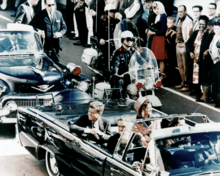
Published on September 26, 2013 14:58
September 25, 2013
Forgotten Books: Cross Country by Herbert Kastle
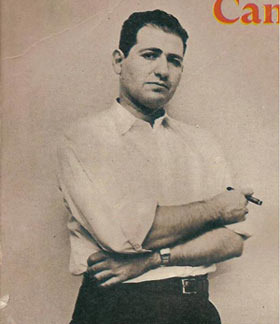
FORGOTTEN BOOKS: CROSS COUNTRYHerbert D. Kastle wrote a number of science fiction stories in magazines of the 1950s. That's where I first read him. Later in the 1960s he was writing those fat sexy bestseller-type novels that owed more to marketing and Harold Robbins than his presumed muse. Then in 1974 he wrote CROSS COUNTRY. Here's a quote from one of the reviews: "This novel seems to occupy the same dark and twisted territory as the works of Jim Thompson. Characters interact in a dance of barely suppressed psychopathological urges and desires that is as grotesquely fascinating as a multi-car pileup on the freeway. It may leave you feeling unclean afterwards, but chances are you will not forget it."
Damn straight. It really is a sewer of sex and terror and blood-soaked suspense. I read it in one long sitting. If it's trash, as some called it at the time, it is spellbinding trash.
IMDB sums up the story line succintly: "After a woman is found butchered in her New York apartment, suspicion falls on her estranged husband, an ad executive who has suddenly left town on a cross-country road trip. He takes along a beautiful girl he met in a bar and a drifter he picked up along the way. A cop sets out after the husband, but he's more interested in shaking him down than bringing him back."
Kastle masterfully controls his long nightmare journey and you buy into his paranoia. He shows you an American wasteland of truck stops, motels, convenience stores connected by interstate highway and darkness. By book's end everyone will betray everyone else. This is survival of the fittest enacted by a Yuppie businessman, sociopathic hippies and a crooked cop. The sheer nastiness of Kastle's existential vision make this book impossible to forget. Thirty-some years after I first read it I still think of it from time to time when hundreds of other novels have fled from memory.
It's a vision of hell that fascinates you as it troubles your conscience.
Published on September 25, 2013 13:26
Magazine of The Month - Cemetery Dance #70
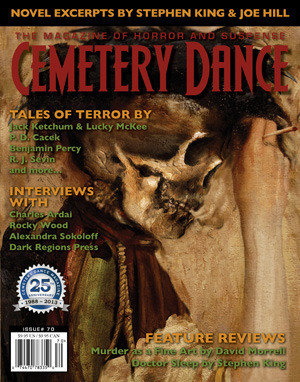
Issue #70
Publication Date: September 2013
Cover Artist: Caniglia
Interior Artists: GAK, Stephen C. Gilberts, Zach McCain, Alex McVey, Keith Minnion, Will Renfro, Chad Savage, Nick Tripiciano
Page Count: 136A Note From the Publisher:
This issue features excerpts from Stephen King and Joe Hill's latest novels.Fiction
"An Excerpt from Doctor Sleep" by Stephen King
"An Excerpt from NOS4A2" by Joe Hill
"Squirrely Shirley" by Jack Ketchum & Lucky McKee
"The Good Wife" by P. D. Cacek
"Resolution" by Stephen Couch
"The Dummy" by Benjamin Percy
"Red Soil" by Robert Dunbar
"Are You My Mother?" by Sara Berniker
"Something of Value" by Terence Butler
"In Her Hand, a Rag, a Rope" by Ronnie SevinFeatures
"An Interview with Hard Case Crime Publisher Charles Ardai" by Bev Vincent
"A Few Words with Dark Regions Press" by Robert Morrish
"An Interview with Alexandra Sokoloff" by Darrell Schweitzer
"An Interview with Rocky Wood" by Lisa Morton
"Feature Review: Doctor Sleep by Stephen King" by Bev Vincent
"Feature Review: Murder as a Fine Art by David Morrell" by David SimmsThe Usual Suspects
"Words from the Editor" by Richard Chizmar
"Stephen King News: From the Dead Zone" by Bev Vincent
"The Mothers and Fathers Italian Association" by Thomas F. Monteleone
"Horror Drive-In" by Mark Sieber
"Fine Points" by Ed Gorman
"MediaDrome" by Michael Marano
"The Last 10 Books I've Read" by Ellen Datlow
"Spotlight on Publishing" by Robert Morrish
"Cemetery Dance Reviews"
"The Final Question" by Brian James Freeman
Published on September 25, 2013 08:53
September 24, 2013
Carolyn Hart
[image error]
Dear Ed, I'm excited to have a great cover for the new book. Bailey Ruth Raeburn, Heaven's irrepressible sleuth, arrives October 1 on the Rescue Express in GHOST GONE WILD. Bailey Ruth returns to earth to help a scruffy but lovable 20-something-video-game inventor who has lots of money and just as many enemies. Bailey Ruth foils a shooting, but discovers her Heavenly supervisor has no idea she's on earth and this time she may never make it back to Heaven! Best, Carolyn
Dear Ed, I'm excited to have a great cover for the new book. Bailey Ruth Raeburn, Heaven's irrepressible sleuth, arrives October 1 on the Rescue Express in GHOST GONE WILD. Bailey Ruth returns to earth to help a scruffy but lovable 20-something-video-game inventor who has lots of money and just as many enemies. Bailey Ruth foils a shooting, but discovers her Heavenly supervisor has no idea she's on earth and this time she may never make it back to Heaven! Best, Carolyn
Published on September 24, 2013 12:58
Ed Gorman's Blog
- Ed Gorman's profile
- 118 followers
Ed Gorman isn't a Goodreads Author
(yet),
but they
do have a blog,
so here are some recent posts imported from
their feed.



